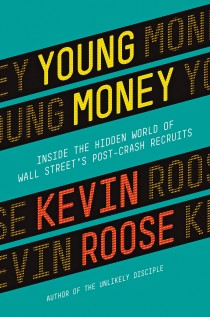 YOUNG MONEY: INSIDE THE HIDDEN WORLD OF WALL STREET’S POST-CRASH RECRUITS
YOUNG MONEY: INSIDE THE HIDDEN WORLD OF WALL STREET’S POST-CRASH RECRUITS
By Kevin Roose
Roose remembers having dinner at a Manhattan home, where a young woman mentioned she’d taken a job at a bank. Which one? The young woman cast her eyes down and croaked out the words “Gold . . . man . . . Sachs?” An awkward silence followed. To Roose, it was as if she’d just spilled wine on the host. If she felt this embarrassed to work on Wall Street, he thought, there must be other young people like her, ashamed, in a climate of shareholder lawsuits and protests such as Occupy Wall Street, to admit to careers in finance.
Roose, a former New York Times reporter who covered Wall Street, knew that banks recruited heavily from the top schools. For instance, in 2006, 46 per cent of seniors at Princeton were headed for Wall Street. But times had changed since the crash of 2008. What pitches were banks using to coax students now? he wondered.
To find out, Roose visited Ivy League campuses and was surprised to hear that a bank like Morgan Stanley doesn’t even mention salary anymore. Students don’t flock to Wall Street to cash in; they go because it’s an easy choice, explained one analyst. According to Roose, banks make the application process as easy as dropping a resumé into a box, and inform applicants of jobs months ahead of other industries. “Banks have become extremely skilled at appealing to the anxieties of overachieving young people and inserting themselves as the solution to their worries.”
For three years, Roose shadowed eight young analysts who candidly shared their emails and diaries with him with the promise of anonymity and infiltrated events, such as Finance Meets Fashion, a gathering described by Gawker as “where banker-types meet fashion slaves and procreate to create lineages of people you’d rather not know.” Even here, Roose met disaffected young financiers, such as the hedge fund trader who won’t tell women what he does for a living because “you’re seen as taking away people’s mothers’ retirement money.” The highly opinionated Roose says most young bankers these days are “smart and capable in a general, all-purpose way, but aren’t phenomenally talented at any one thing.”
Julia McKinnell